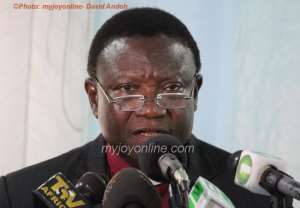
The National Peace Council has directed the Ghana Education Service (GES) to introduce a dress code policy in first and second cycle institutions.
The Service is also to ensure students practice their religious beliefs without fear of discrimination or victimisation.
The directive is contained in a communiqué issued after a two-day consultative dialogue on peace called by the National Peace Council to discuss and seek solutions to claims and counterclaims relating to religious tolerance and violation of constitutional rights of Muslim students.
The dialogue was triggered by a demonstration held by some Muslim groups in Takoradi in the Western Region protested against what they described as discrimination against Muslims in Christian schools.
Some WAEC officials in the Western Region were also said to have asked candidates taking passport-size photos during registration for the exams to remove their headscarves or hijabs because they concealed features including the forehead, nose and chin.
Chairman of the National Peace Council Most. Rev. Prof. Emmanuel Asante said there is a need for some control in schools across the country and the GES must provide an acceptable framework to suit all stakeholders.
Below is the complete communiqué issued by the council.
National Stakeholders Forum on Religious Tolerance and Freedom in Ghana
Communique:
The National Stakeholders Forum on Religious Tolerance and Freedom in Ghana was convened by the National Peace Council to discuss and seek solutions to claims and counterclaims relating to religious intolerance and alleged violations of constitutional rights, including freedom to practice any religion and the freedom to manifest such practice in our schools and in workplaces.
After an open and exhaustive deliberation, the Stakeholders, guided by the issues raised by four (4) distinguished speakers, resolved as follows:
That in order to provide a platform for continuous dialogue, an independent inter- religious body shall be set up to work closely with the NPC.
That GES shall provide a policy framework for the creation of an, acceptable dress code and the use of religious symbols in schools taking into consideration the legitimate concerns of interested religious groups.
That GES shall oversee the formation of inter-religious Chaplaincy Boards in schools to create the platform for the exercise of freedom of religion and freedom of worship.
That Schools Computerised Selection Programme must be reviewed to broaden the choices and selection of schools.
That all schools or institutions must create an environment where students feel welcome without any fear of discrimination or victimization on religious grounds.
Taking into consideration the provisions of the Constitution on human rights, no Public School shall require students who are followers of a different religion to participate in acts of worship, devotion or fellowship without their consent or the consent of their parents, if the students are minors. This is without prejudice to the general assembly which precedes daily school activity.
7. That in the case of Assisted Public Schools and private schools we recommend the need for dialogue and time for the implementation of Article 21 (c) of the 1992 Constitution.
8. That reasonable space, allowance or facilities shall be provided for students to congregate for the purpose of prayer or acts of worship at times and places which do not conflict with teaching and learning. This does not create an obligation to build a special place of worship.
9. That parties concerned should seriously consider the suggestion that in public schools funded by the State, a general prayer without any specific peculiarities at the morning Assembly or any other general student gathering should be offered, or done on alternate basis or done at the same time.
10. That in the pursuit of our religious undertakings, we should all be guided by the fact that Ghana is a secular state and also be guided by an abiding commitment to national peace, unity and development.




 Ejisu by-election: Aduomi warns NPP against voter intimidation
Ejisu by-election: Aduomi warns NPP against voter intimidation
 High Court orders implicated four NDA officials to present defence
High Court orders implicated four NDA officials to present defence
 Let’s all be matured, patriotic to have a peaceful election this year – Dampare ...
Let’s all be matured, patriotic to have a peaceful election this year – Dampare ...
 Mahama's administration saw thievery that knew no bounds; stole from market wome...
Mahama's administration saw thievery that knew no bounds; stole from market wome...
 GRA/SML deal: Always read the stories behind the headlines or you'd look stupid ...
GRA/SML deal: Always read the stories behind the headlines or you'd look stupid ...
 GRA/SML Contract: It takes some 'wild' boldness for a president to make this dec...
GRA/SML Contract: It takes some 'wild' boldness for a president to make this dec...
 Elisu By-election: "If you call yourself a man, boo Chairman Wontumi again" — Bo...
Elisu By-election: "If you call yourself a man, boo Chairman Wontumi again" — Bo...
 Fuel tanker driver escapes with his life after tanker goes up in flames near Suh...
Fuel tanker driver escapes with his life after tanker goes up in flames near Suh...
 Uniform change: ‘Blue and white are brighter colours’ — Kwasi Kwarteng explains ...
Uniform change: ‘Blue and white are brighter colours’ — Kwasi Kwarteng explains ...
 MoE not changing all public basic school uniforms but only newly built ones — Kw...
MoE not changing all public basic school uniforms but only newly built ones — Kw...
